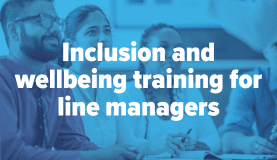Preventing and Addressing Sexual Harassment Workshop
Advisory Services:
Preventing and addressing sexual harassment workshop
What our workshop offers
Addresses legislative requirements
New protections from sexual harassment have come into force under the Equality Act 2010.
Businesses now have a legal duty to take reasonable steps to prevent sexual harassment and create a safe working environment.
Provides expert advice for your organisation
This workshop, led by our specialist and expert inclusion advisers, will provide your organisation with the guidance needed to comply with these legal requirements and foster a safe and inclusive workplace.
Equips employees to recognise and prevent harassment
Employees will gain a clear understanding of what constitutes sexual harassment through use of statistics, real-life stories, and case studies. Through interactive discussions, participants are encouraged to reflect on their behaviour, challenge others, and develop strategies to prevent harassment.
Empowers employees to act should harassment occur
This session empowers participants to support employees facing harassment, ensuring everyone feels confident and prepared to respond appropriately should harassment occur in the workplace.
Gives an intersectional lens to the issue of harassment
The session takes a nuanced approach to sexual harassment, explaining how people with minoritised identity characteristics are likely to experience disproportionately high levels of harassment.
Creates a proactive and positive workplace culture
Proactively committing to a harassment-free workplace positions your organisation as a leader in a positive culture and responsible business practices. This boosts productivity, enhances recruitment and retention, and strengthens your reputation.
Our intersectional approach
Sexual harassment impacts individuals differently based on gender, disability, race, and more. These disparities highlight the importance of using an intersectional lens, which is why our Advisory Services experts integrate this perspective in both the design of our workshop and in the key lessons participants will gain. Understanding how overlapping identities shape experiences of harassment is crucial in creating effective solutions and support systems within your teams and organisations
of disabled women face sexual harassment, compared to 52% of their peers. Two third of disabled women who were sexually harassed did not report it to their supervisors.4
of participants in a survey of Black women reported experiencing sexual harassment of some form, with high rates of unwelcome verbal sexual advances, unwanted touching, or sexual jokes. 58% of Black women who experienced sexual harassment did not report it to their employer, with 38% saying they did not think it would be taken seriously if they did.5
Our other trainings and workshops
Our Advisers deliver training and workshops focusing on the key areas that support organisations to address Environmental, Social and Governance (ESG) challenges, future proof their business and advance their responsible business journey.
Get in touch
If you are interested in this workshop or learning more about our advisory services, please fill out the form below and a member of the team will get back to you.
References
- Government Equalities Office 2020 Sexual Harassment Survey ↩︎
- Government Equalities Office 2020 Sexual Harassment Survey ↩︎
- New TUC poll: 2 in 3 young women have experienced sexual harassment, bullying or verbal abuse at work | TUC ↩︎
- https://www.tuc.org.uk/sites/default/files/2021-07/DisabledWomenSexual%20harassmentReport.pdf ↩︎
- Black women’s experience of sexual harassment in the workplace | TUC ↩︎



